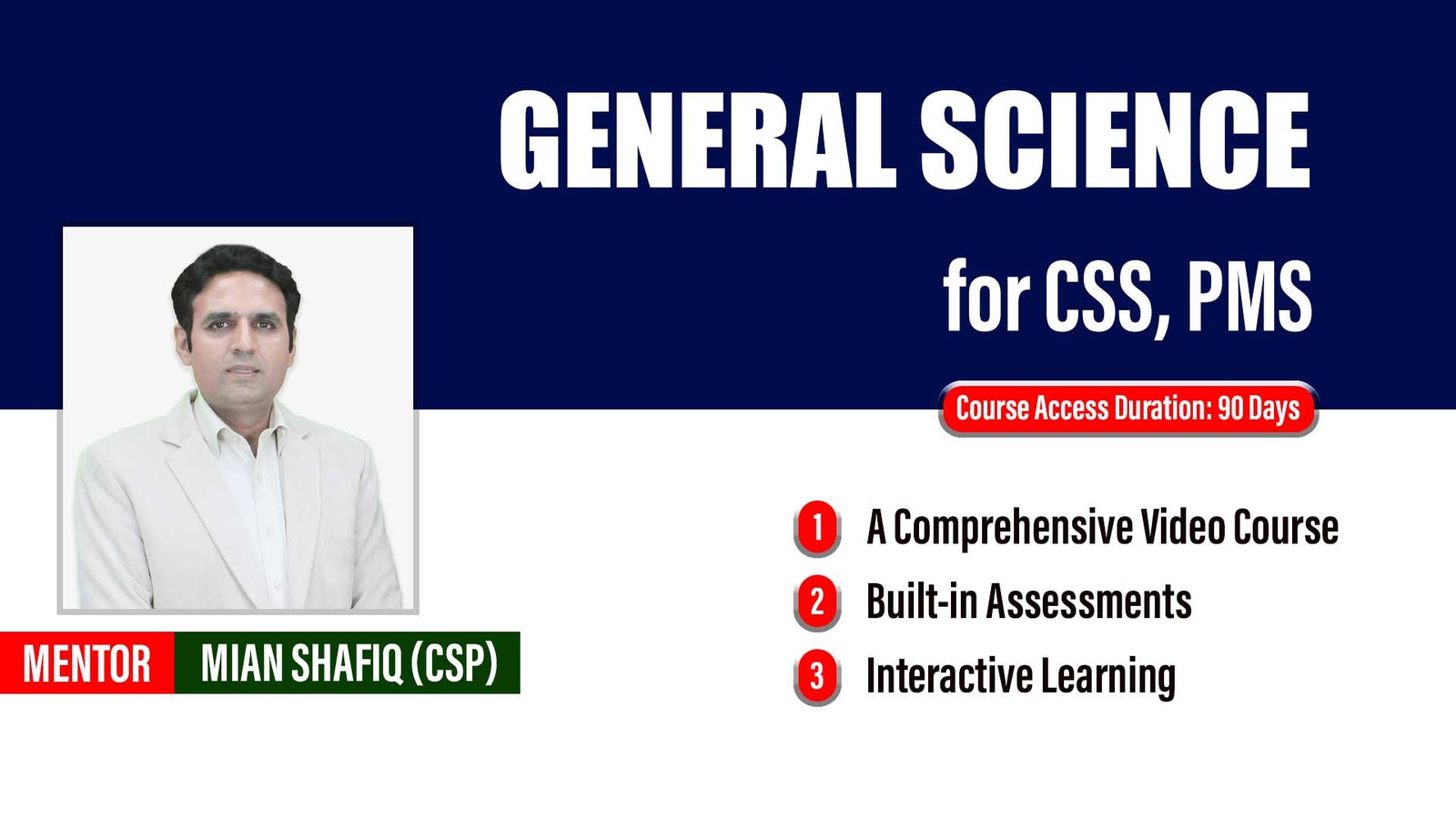
General Science for CSS, PMS
- Date March 19, 2021
Course Videos Duration: 18 Hours and 40 Minutes
Course Access Duration: 90 Days Only
Please note that this course will be only available for 90 days next to your enrollment. After that, the course will be expired and you won’t be able to access it.
Introduction
General Science & Ability is a compulsory subject in CSS. It is one of the highest-scoring subjects. However, the diversity of topics included in this subject makes it one of the trickiest subjects as well. However, students can get high marks if they study quality content and get guidance from professional and seasoned teachers.
Learning Objectives
CSS General Science & Ability syllabus is divided into two different parts: General Science and General Ability. However, This course will cover the General Science Part Only. Syllabus is given below
General Science – 60 Marks
I. Physical Sciences
- Constituents and Structure:- Universe, Galaxy, Light Year, Solar System, Sun, Earth, Astronomical System of Units.
- Process of Nature:- Solar and Lunar Eclipses, Rotation and Revolution, Weather Variables (Global Temperature, Pressure, Circulation, Precipitation, Humidity) and Weather Variations.
- Natural Hazards and Disasters:- Earth Quake, Volcanic Eruption, Tsunami, Floods, Avalanche, Travelling Cyclone (Tropical Cyclone, Middle Latitude Cyclone, and Tornadoes), Drought, Wildfire, Urban Fire. Disaster Risk Management.
- Energy Resources:- Sources of Energy (Renewable i.e. LED Energy, Solar Energy, Wind Energy, and Non-Renewable Energy conservation and its sustainable use.
- Atomic Structure, Chemical Bonding, Electromagnetic Radiations.
- Modern Materials/Chemicals:- Ceramics, Plastics, Semiconductors. Antibiotics, Vaccines, Fertilizers, Pesticides.
II. Biological Sciences
- The Basis of Life:- Cell Structures and Functions (Subcellular Organelles such as Nucleus, Mitochondria, and Ribosomes).
- Biomolecules:- Proteins, Lipids, Carbohydrates, and Enzymes.
- Plant and Animal Kingdom:- A brief survey of plant and animal kingdom to pinpoint similarities and diversities in nature.
- A Brief Account of Human Physiology.
- Common Diseases and Epidemics:- Polio, Diarrhea, Malaria, Hepatitis, Dengue their Causes and Prevention.
- New Model Concept of Producing BIO Fuel Method
III. Environmental Science
- Environment:- The Atmosphere (Layered Structure and Composition), Hydrosphere (Water Cycle, Major Water Compartments), Biosphere (Major Biomes), and Lithosphere (Minerals and Rocks, Rock Types, Plate Tectonics).
- Atmospheric Pollution:- Types, Sources, Causes and effects of major air pollutants (COx, Particulate Matter, NOx, SOx, Tropospheric Ozone, Volatile Organic Compounds, Dioxins). Regional and Global air pollution issues (Acid-rain, Ozone Depletion, Greenhouse Effect, and Global Warming). International agreements on air pollution control (Montreal Protocol and Kyoto Protocol).
- Water Pollution:- Types, sources, causes, and effects of major water pollutants (Synthetic Organic Chemicals, Oxygen Demanding Wastes, Plant Nutrients, Thermal Pollution, Infectious Agents, Sediments, Radioactivity, Heavy Metals, and Acids). Drinking water quality and standards.
- Land Pollution:- Solid waste management and disposal.
- Role of Remote Sensing and GIS in Environmental Science.
- Population Planning.
IV. Food Science
- Concept of Balance Diet:- Vitamins, Carbohydrates, Protein, Fats and oil, Minerals, Fiber.
- Quality of Food:- Bioavailability of Nutrients, Appearance, Texture, Flavor, Quality of Packed and Frozen Food, Food Additives, Preservatives and Antioxidants
- Food Deterioration and its Control:- Causes of Food Deterioration, Adulteration, Food Preservation.
V. Information Technology
- Computer (Hardware & Software Fundamentals); I/O Processing and data storage, Networking & Internet Standards, Application, and Business Software, Social Media Websites. Information Systems. Fundamentals of artificial intelligence.
- Telecommunications:- Basics of Wireless Communication (Mobile, Satellite, Surveillance, and GPS and Fiber Optic, etc.
Bottom Line
Teaching Methodology
Study River believes in enabling students to learn at their own pace from the comfort of their homes. Systematic and meticulously explained understanding of course content and developing the students’ analytical & critical skills enables students to obtain the highest marks. Online learning of this subject provides students with the additional advantage of learning at their own pace and from the comfort of their homes.
Final Accomplishments
Study River expects students to achieve:
Highest marks in General Science CSS, PMS and Screening Test.
Completion of General Science & Ability syllabus in the easiest possible way.
Complete understanding of the topics included in General Science & Ability syllabus.
Advance teaching methodology with the aim to make students learn in the easiest possible way.
Course Clips
Clips from different videos of this course.
